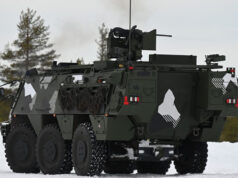QinetiQ Australia has been awarded a $12.9 million contract to collaborate with the Department of Defence to co-develop and manufacture a high energy defensive laser system prototype in South Australia.
A world leader in laser research and technology, QinetiQ will work in collaboration with Defence Science and Technology Group (DSTG) to establish a high energy laser manufacturing capability in Australia.
“We are incredibly proud of the long-standing and deep partnership between QinetiQ Australia and DSTG,” Simon Fredericks, Managing Director, Engineering Services, QinetiQ Australia said.
“By leveraging QinetiQ’s high-power laser technology and test and evaluation expertise in collaboration with DSTG’s scientific innovation, we will deliver enhanced sovereign capability to the ADF.”
QinetiQ is an industry leader in high-power laser technology and test and evaluation expertise. Further information on QinetiQ is available here.














A very smart move, I assume ground-based lasers allow for more power and greater distance to intercept incoming threats.
Something we should be on board with.
Only if the weapon system is static. Using a fixed site you don’t have to worry about packaging the generator or cooling systems in a vehicle or ship.
But then you will have to locate it near to a strategically important asset. As the effective range will still be fairly low.
Hopefully, shipbourne systems will prove to be a rational compromise for viable first gen systems, in terms of packaging, power consumption, mobility (in fact all the “ilities”). Perhaps optimistically, believe this will become one of many AUKUS Pillar 2 R&D initiatives, although not noted in initial summary list. The worrisome unanswered question is the rate of progress of the scum-sucking, slimeball ChiComs on parallel program(s). 🤔😳
Moving quickly, and so should we. You can begin to see why an invasion is likely by 2028 if Russia is not stopped in its tracks this year.
Fingers crossed Ukraine gets everything it needs to do just that.
Chinese WS-15 engine prepared for mass production07 APRIL 2023
LINK
China has simulated precision strikes against key targets on Taiwan and its surrounding waters during a second day of military drills.
The drills – which Beijing has called a “stern warning” to the self-governing island – are a response to Taiwan’s president visiting the US last week.
As the Chinese military simulated an encirclement of the island, the US urged China to show restraint.
Taiwan said at least 71 Chinese jets flew around the island on Saturday.
Taiwan also said 45 warplanes either crossed the Taiwan Strait median line – the unofficial dividing line between Taiwanese and Chinese territory – or flew into the south-western part of Taiwan’s air defence identification zone.
Nine Chinese ships were also spotted. The operation, dubbed “Joint Sword” by Beijing, will continue until Monday. Taiwanese officials have been enraged by the operation.
LINK
We can read the news Nigel. We don’t need you to repeat it.
What a complete tosser.
It’s a worry, the worlds stance of Taiwan has not helped the issues. I’ve never understood why Taiwan hasn’t been recognised as a country. The USA might be willing to defend an area it doesn’t think should be a country and is part of China? Very confusing.
China knows it has a 2-3 days to get onto the island and remove the government. I don’t see how support can be given as the island will be surrounded. No ships, planes will be able to get to Taiwan.
The U.K, Europe won’t do anything to help, India won’t get involved, Korea, Japan, Philippines not likely to do anything quick enough, the USA can’t act quickly enough.
Hopefully nothing happens and china’s next leaders calm down a bit.
Exactly, they’ve seen how hesitant the West was prior to the Invasion of Ukraine and reluctant to get fully involved once they did.
The same problem faces Taiwan, once the island is surrounded the West would have to directly attack China to remove the blockade.
If we had provided Ukraine with CAP initionally this sad story could have had a very different outcome.
Sadly, the country is being systematically destroyed, countless lives lost and a huge expense in supplying weapons to remove Russian forces from their territory.
Ukraine war has shown the importance of defending the key power generation sites, so if they can be made cheap enough, then that would be a key usage. Plus power for the system would then be a none issue, as you would have plenty on tap.
“That was my thinking, a laser version of Iron Dome if you like situated around major cities, airfields, etc.
“Our technology today is ready to defend against small rockets, artillery shells and mortars, small unmanned aerial vehicles, small attack boats and lightweight ground vehicles that are approximately a mile way.
As fiber laser power levels increase, our systems will be able to disable larger threats and do so across greater distances.
When operated in conjunction with kinetic energy systems, these systems can serve as a force multiplier.”
LINK
Pew Pew
$12.9M AUS isn’t much. About £6.5m. Is that correct? I’m sure it took more money to develop a laser pointer pen to use in office presentations.
Its mainly a contract to develop Australian domestic manufacturing capability to produce a Dragonfire, the contracts goal isnt the prototype per se but gaining the ability to manufacture further laser components domestically in the future.
That makes sense and good news if so.
Starship enterprise here we come
Lol. That’s what my brain said when I first saw the image.
If QinetiQ UK is the HQ wouldn’t they be involved in these developments too? But good on 🇦🇺 anyway. Hope the UK’s Dragonfire gets some further press and upcoming success and adoption by our forces.
It seems to be on track, or should I say target!
“On Tuesday, the MoD-sponsored Defence Science and Technology Laboratory (Dstl) announced it had successfully completed tests of the high energy laser (HEL) at its range facility in Porton Down, Wiltshire, on Oct. 28.
According to Dstl officials, tests confirmed DragonFire’s capability to generate “useful effects” against a variety of targets. The weapon system features a 50-kW-class, solid-state and transparent laser.”
LINK
The military IP world does not work like that. Anything developed in one country comes under the control of that country (unless by agreement). Even if engineers & scientists come from somewhere else. Some companies will go to great extent to avoid this situation. US restrictions are well known, but even US companies will look to avoid these restrictions (while staying onside). Boeing comes to mind.
Hence you get LM paying BAE US to develop a new RF sensor for LRSM because BAE Australia developed a new one (unrelated) with Australian government funding, for Konsberg’s JSM (Australia is helping Norway fund JSM), that was better than their (LM) existing sensor (which was originally developed by BAE US). BAE could just give LM the Konsberg sensor, but that requires Australia to agree (& likely LM finding out). So BAE are laughing all the way to the bank while reinventing the wheel (so to speak), while still having to ‘actually’ reinvent the wheel.
My guess is that one day. Laser weapons will operate on a military satellite in space. James Bond – Moonraker predicted it. 😁